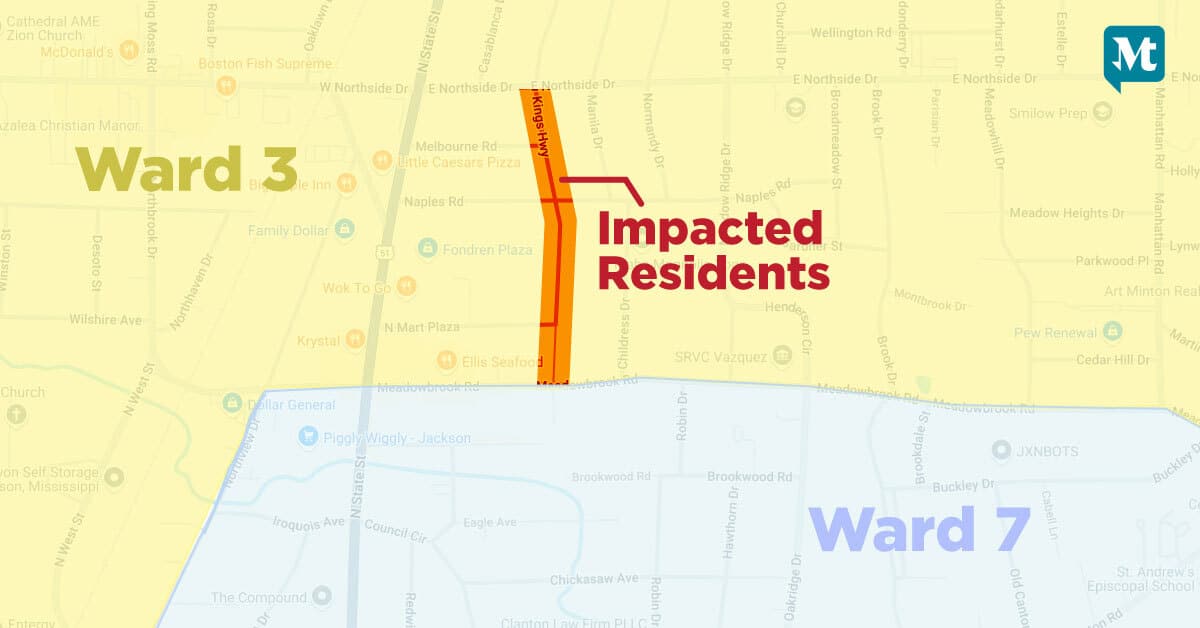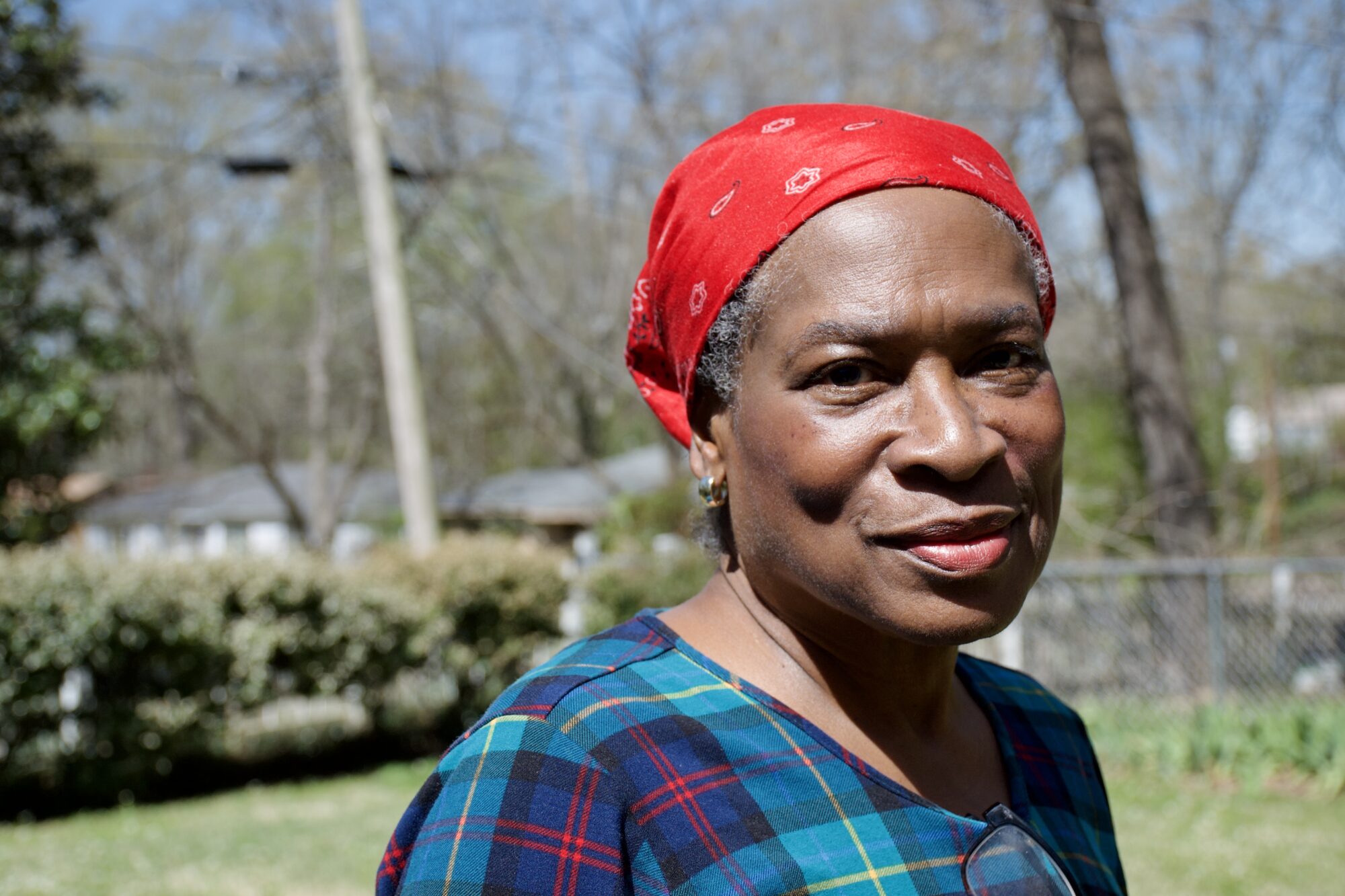Mississippi Today
A Jackson resident of Ward 3, due to city error, votes in Ward 1 primary

A Jackson resident of Ward 3, due to city error, votes in Ward 1 primary
For the last 10 years, north Fondren resident Patricia Ice has called private investment advisor Ashby Foote, the lone Republican on the Jackson City Council, her councilman.
But after the city redrew its ward maps last year due to population declines, the shape of the voting district Ice used to live in, Ward 1, shifted east, meaning she now lives in Ward 3.

With that came a new city representative, and from appearances, a polar opposite one: Democrat Kenny Stokes, a 33-year veteran on the council known for eccentric quotes delivered in a thick Southern accent. “The mayor must stop smoking that dope,” he said to the local TV station in 2022.
But because of an error that was later corrected, Ice and dozens of her neighbor’s addresses were initially left out of the move, resulting in Ice casting an invalid Ward 1 ballot in this year’s municipal primary election.
For some, the snafu has caused anxiety surrounding an election that, with 19 candidates in the mayoral race alone, has already proven difficult for residents to navigate.
“So when we vote, will our votes count or matter, since the ballots will be erroneous? Sounds like it could turn into a mess,” one of Ice’s neighbors wrote in a group messaging app.
In February, the Jackson City Clerk’s Office sent out some 6,000 letters to people who, like Ice, experienced a ward change, notifying them ahead of the April 1 primary Election Day which council race they would be voting in.
Ice’s neighbors on bordering streets received the mail confirming they’d been switched to Ward 3. They discussed it in the group chat. But Ice’s letter never came.
Ice called the city clerk, Angela Harris, and the Hinds County Circuit Clerk, Zack Wallace. She recited to them her Kings Highway address and they told her she still lived in Ward 1 – disregarding the published maps that showed her house inside Ward 3. Since Ice is over 65 years old, she had the opportunity to cast an absentee vote.
“That’s when I went to vote early because I said, ‘I’m going to see what’s on my ballot,’” Ice said.
On Mar. 7, Ice cast her vote in the Democratic primary election for Ward 1. Her preferred Ward 1 council candidate is an independent, so on the Democratic ballot, she wrote in her own name for that race. Harris told Mississippi Today Wednesday that Ice was the only person from the impacted section of Kings Highway to vote absentee.
The Secretary of State, which oversees elections, directed questions about this story to the local clerk, but told Mississippi Today that “any errors in redistricting that allow a voter to vote in the wrong district may result in an elections challenge.”
The 2020 U.S. Census found Jackson’s population fell by about 20,000 since 2010, with the decline especially affecting Ward 5 and 3, WLBT reported. The 1964 Voting Rights Act requires that the city’s population be evenly distributed among the districts, with no ward deviating in size by more than 10%, and requires governments to reevaluate every 10 years after the census.
The city commissioned the Central Mississippi Planning and Development District to help it redraw the lines and held public hearings to discuss the changes, which were adopted last August. Part of the hope was that in redrawing cleaner lines, the city could cut down on the number of split precincts, that is, the polling places that serve people of different wards and must manage handing out different ballots on Election Day.
Harris told Mississippi Today that she gave the new maps to the city’s GIS department, which culled the list of addresses that changed wards. Harris gave that list to Wallace, who was responsible for updating the voter registration database and pulling the names of residents who would need to be notified. But Wallace said the two-block section of Kings Highway from Meadowbrook to Northside Drive was left out of the spreadsheet of addresses he received.
“So those 50 something people are still right now in Ward 1,” Harris told Mississippi Today last week, not indicating a change would be made before the election.

If true, those Kings Highway residences would represent an island of Ward 1 voters inside Ward 3. Legally, wards must be contiguous, City Attorney Drew Martin said at a hearing last year.
“They cannot have islands or donuts within them,” Gray Ouzts, Principal Planner for the local planning and development district, told Mississippi Today.
After Mississippi Today spoke to Foote about the error last week, he added an agenda item to discuss the issue at the council’s Tuesday meeting. Then Harris took action, sending Wallace a list Monday of the Kings Highway addresses that had been left out. Wallace quickly updated the voter registration database to reflect their correct ward and letters went out to those residents the same day.
Another impacted Kings Highway resident, Jennifer Baughn, spoke to Mississippi Today before the correction was made. It may not have made a difference on the outcome of the race, but to Baughn, the error threatened to lock her out of the democratic process. Baughn concluded that if she’d received a Ward 1 ballot, she’d have voted for someone who wouldn’t actually represent her.
“That’s the essence of disenfranchised. And yet, there’s no acknowledgement from the city clerk … It’s ridiculous,” Baughn said before her voter registration was corrected. “I wasn’t super happy about being moved, but now I’m feeling like we won’t be getting representation from either (council member), because the Ward 1 candidate is going to know that we’re not going to be voters the next time, so why put the effort into our street? And we have major issues.”
Baughn said a new nightclub opened up within a block of her house, and the music and traffic have kept her awake into the wee hours of the night.
She said she’s also run into similar ambiguity about which of the separate police forces in Jackson are there to serve her. Take a noise complaint, for example. She said when she calls Jackson Police Department, an employee has told them she is in the jurisdiction of Capitol Police, and when she’s called Capitol Police, they’ve told her they don’t deal in city ordinance enforcement.
“We have no one to call. We call the police and they say, ‘Oh you need to talk to your council person,’ and I’m like, ‘Okay who is our council person?’” Baughn said.
Though he hasn’t made contact with his new constituents yet, Stokes is apparently up to speed on the issues residents in that area are facing, bringing up nightclubs unprompted. “I ride, I ride my whole ward,” Stokes said. “I ride, I look, I observe, and I pay attention to the different patterns that’s taking place.”
Abigail Hartman, president of the Fondren North neighborhood association, said her community was generally pleased when they learned they would be represented by Stokes, who they feel is more responsive to constituents, rather than Foote.
While Foote tinkers away in his office on maps he had made of all state-owned tax forfeited property in Jackson, a driver of blight across the city, Stokes appears at community events he’s organized, shaking hands and wearing his signature black hat with white serif font reading, “STOKES”.
Ironically, despite their quite different tacks, constituents of Stokes and Foote currently receive very similar representation on the council since the two men nearly always vote together, particularly on items where they have a chance to oppose Mayor Chokwe Lumumba.
“Politics makes for strange bedfellows,” Foote said. “We’ve both had differences with the mayor.”
In 2022, during a spat over selecting a new garbage contractor, Lumumba accused both Foote and Stokes of taking bribes from one of the vendors, which they both denied. (Hence, Stokes’ “smoking dope” quote).

Later, at the end of Foote’s term as council president, the Ward 1 councilman had replica black and white ball caps made for himself and all the other council members spelling their own names in “the Stokes lettering,” Foote said.
From hurling taunts like “Yo mama” or suggesting Black leadership “throw rocks and bricks and bottles” at suburb police to calling out Lumumba, who was eventually indicted by federal prosecutors, “Stokes has evolved a lot over the last eight years,” Foote said.
“I think he’s seen more as a voice of common sense now,” Foote said.
There are a total of 52 candidates running for either mayor or council this year, including Lumumba and 11 challengers in the Democratic primary for mayor April 1. Foote chose to run as an independent as a way to encourage his supporters to participate in the Democratic primary, which commonly determines the winner for mayor. Foote, who represents a whiter, wealthier part of the city in northeast Jackson, will face two challengers in the general election – the Democratic nominee and one independent. Four are running for Ward 1 in the Democratic primary.
So the north Fondren residents who moved from Ward 1 to Ward 3 have a little easier decision this election. Stokes does not face a challenger until the General Election in June, when he runs against one independent.
But once Hartman learned some residents in her association were told they’d still be voting in Ward 1, “We’re having to research double the amount of candidates,” she said.
“I’ve never had to work so hard in an election season,” Hartman said.
Adding to the confusion, campaign signs and mailers for Ward 1 candidates began popping up in Hartman’s neighborhood, causing residents to wonder who exactly was mistaken.
“If anything, it should have been caught. It’s sad that it took some of the individuals in the neighborhood to dig into this and find the information for themselves,” Hartman said.

Ice received a letter Tuesday notifying that her vote had been voided and she’d have to go back to City Hall to cast a new absentee ballot for Ward 3. But unlike some of her neighbors, she wasn’t too bothered. “I don’t mind going down there to vote again,” she said.
“I was never that worried about it,” Ice said. The only thing she’s sought from the council was, years ago, for them to add some speed bumps to her street, which never materialized.
The longtime immigrant rights attorney is much more concerned about what’s happening on a national level, the new Trump administration’s dismantling of federal programs and threats towards democracy, which she described as a coup d’état.
The local election ordeal did, however, remind Ice of the impression she had when she moved to Mississippi from her hometown of Detroit in 1998. She’d heard of Mississippi’s notorious history of voter intimidation and disenfranchisement, a legacy still visible today through the state’s attachment to some of the most restrictive voting laws in the nation. When Ice registered to vote in Mississippi for the first time, she said she was required to get the signature of a sponsor in her area.
“This is really true,” she remembered thinking, “they really do have a hard time voting here.”
This article first appeared on Mississippi Today and is republished here under a Creative Commons license.![]()
Mississippi Today
Speaker White wants Christmas tree projects bill included in special legislative session

House Speaker Jason White sent a terse letter to Lt. Gov. Delbert Hosemann on Thursday, saying House leaders are frustrated with Senate leaders refusing to discuss a “Christmas tree” bill spending millions on special projects across the state.
The letter signals the two Republican leaders remain far apart on setting an overall $7 billion state budget. Bickering between the GOP leaders led to a stalemate and lawmakers ending their regular 2025 session without setting a budget. Gov. Tate Reeves plans to call them back into special session before the new budget year starts July 1 to avoid a shutdown, but wants them to have a budget mostly worked out before he does so.
White’s letter to Hosemann, which contains words in all capital letters that are underlined and italicized, said that the House wants to spend cash reserves on projects for state agencies, local communities, universities, colleges, and the Mississippi Department of Transportation.
“We believe the Senate position to NOT fund any local infrastructure projects is unreasonable,” White wrote.
The speaker in his letter noted that he and Hosemann had a meeting with the governor on Tuesday. Reeves, according to the letter, advised the two legislative leaders that if they couldn’t reach an agreement on how to disburse the surplus money, referred to as capital expense money, they should not spend any of it on infrastructure.
A spokesperson for Hosemann said the lieutenant governor has not yet reviewed the letter, and he was out of the office on Thursday working with a state agency.
“He is attending Good Friday services today, and will address any correspondence after the celebration of Easter,” the spokesperson said.
Hosemann has recently said the Legislature should set an austere budget in light of federal spending cuts coming from the Trump administration, and because state lawmakers this year passed a measure to eliminate the state income tax, the source of nearly a third of the state’s operating revenue.
Lawmakers spend capital expense money for multiple purposes, but the bulk of it — typically $200 million to $400 million a year — goes toward local projects, known as the Christmas Tree bill. Lawmakers jockey for a share of the spending for their home districts, in a process that has been called a political spoils system — areas with the most powerful lawmakers often get the largest share, not areas with the most needs. Legislative leaders often use the projects bill as either a carrot or stick to garner votes from rank and file legislators on other issues.
A Mississippi Today investigation last year revealed House Ways and Means Chairman Trey Lamar, a Republican from Sentobia, has steered tens of millions of dollars in Christmas tree spending to his district, including money to rebuild a road that runs by his north Mississippi home, renovate a nearby private country club golf course and to rebuild a tiny cul-de-sac that runs by a home he has in Jackson.
There is little oversight on how these funds are spent, and there is no requirement that lawmakers disburse the money in an equal manner or based on communities’ needs.
In the past, lawmakers borrowed money for Christmas tree bills. But state coffers have been full in recent years largely from federal pandemic aid spending, so the state has been spending its excess cash. White in his letter said the state has “ample funds” for a special projects bill.
“We, in the House, would like to sit down and have an agreement with our Senate counterparts on state agency Capital Expenditure spending AND local projects spending,” White wrote. “It is extremely important to our agencies and local governments. The ball is in your court, and the House awaits your response.”
This article first appeared on Mississippi Today and is republished here under a Creative Commons Attribution-NoDerivatives 4.0 International License.
Mississippi Today
Advocate: Election is the chance for Jackson to finally launch in the spirit of Blue Origin

Editor’s note: This essay is part of Mississippi Today Ideas, a platform for thoughtful Mississippians to share fact-based ideas about our state’s past, present and future. You can read more about the section here.
As the world recently watched the successful return of Blue Origin’s historic all-women crew from space, Jackson stands grounded. The city is still grappling with problems that no rocket can solve.
But the spirit of that mission — unity, courage and collective effort — can be applied right here in our capital city. Instead of launching away, it is time to launch together toward a more just, functioning and thriving Jackson.
The upcoming mayoral runoff election on April 22 provides such an opportunity, not just for a new administration, but for a new mindset. This isn’t about endorsements. It’s about engagement.
It’s a moment for the people of Jackson and Hinds County to take a long, honest look at ourselves and ask if we have shown up for our city and worked with elected officials, instead of remaining at odds with them.
It is time to vote again — this time with deeper understanding and shared responsibility. Jackson is in crisis — and crisis won’t wait.
According to the U.S. Census projections, Jackson is the fastest-shrinking city in the United States, losing nearly 4,000 residents in a single year. That kind of loss isn’t just about numbers. It’s about hope, resources, and people’s decision to give up rather than dig in.
Add to that the long-standing issues: a crippled water system, public safety concerns, economic decline and a sense of division that often pits neighbor against neighbor, party against party and race against race.
Mayor Chokwe Antar Lumumba has led through these storms, facing criticism for his handling of the water crisis, staffing issues and infrastructure delays. But did officials from the city, the county and the state truly collaborate with him or did they stand at a distance, waiting to assign blame?
On the flip side, his runoff opponent, state Sen. John Horhn, who has served for more than three decades, is now seeking to lead the very city he has represented from the Capitol. Voters should examine his legislative record and ask whether he used his influence to help stabilize the administration or only to position himself for this moment.
Blaming politicians is easy. Building cities is hard. And yet that is exactly what’s needed. Jackson’s future will not be secured by a mayor alone. It will take so many of Jackson’s residents — voters, business owners, faith leaders, students, retirees, parents and young people — to move this city forward. That’s the liftoff we need.
It is time to imagine Jackson as a capital city where clean, safe drinking water flows to every home — not just after lawsuits or emergencies, but through proactive maintenance and funding from city, state and federal partnerships. The involvement of the U.S. Environmental Protection Agency in the effort to improve the water system gives the city leverage.
Public safety must be a guarantee and includes prevention, not just response, with funding for community-based violence interruption programs, trauma services, youth job programs and reentry support. Other cities have done this and it’s working.
Education and workforce development are real priorities, preparing young people not just for diplomas but for meaningful careers. That means investing in public schools and in partnerships with HBCUs, trade programs and businesses rooted right here.
Additionally, city services — from trash collection to pothole repair — must be reliable, transparent and equitable, regardless of zip code or income. Seamless governance is possible when everyone is at the table.
Yes, democracy works because people show up. Not just to vote once, but to attend city council meetings, serve on boards, hold leaders accountable and help shape decisions about where resources go.
This election isn’t just about who gets the title of mayor. It’s about whether Jackson gets another chance at becoming the capital city Mississippi deserves — a place that leads by example and doesn’t lag behind.
The successful Blue Origin mission didn’t happen by chance. It took coordinated effort, diverse expertise and belief in what was possible. The same is true for this city.
We are not launching into space. But we can launch a new era marked by cooperation over conflict, and by sustained civic action over short-term outrage.
On April 22, go vote. Vote not just for a person, but for a path forward because Jackson deserves liftoff. It starts with us.
Pauline Rogers is a longtime advocate for criminal justice reform and the founder of the RECH Foundation, an organization dedicated to supporting formerly incarcerated individuals as they reintegrate into society. She is a Transformative Justice Fellow through The OpEd Project Public Voices Fellowship.
This article first appeared on Mississippi Today and is republished here under a Creative Commons Attribution-NoDerivatives 4.0 International License.![]()
Mississippi Today
On this day in 1959, students marched for integrated schools

April 18, 1959

About 26,000 students took part in the Youth March for Integrated Schools in Washington, D.C. They heard speeches by Martin Luther King Jr., A. Phillip Randolph and NAACP leader Roy Wilkins.
In advance of the march, false accusations were made that Communists had infiltrated the group. In response, the civil rights leaders put out a statement: “The sponsors of the March have not invited Communists or communist organizations. Nor have they invited members of the Ku Klux Klan or the White Citizens’ Council. We do not want the participation of these groups, nor of individuals or other organizations holding similar views.”
After the march, a delegation of students went to present their demands to President Eisenhower, only to be told by his deputy assistant that “the president is just as anxious as they are to see an America where discrimination does not exist, where equality of opportunity is available to all.”
King praised the students, saying, “In your great movement to organize a march for integrated schools, you have awakened on hundreds of campuses throughout the land a new spirit of social inquiry to the benefit of all Americans.”
This article first appeared on Mississippi Today and is republished here under a Creative Commons Attribution-NoDerivatives 4.0 International License.![]()
-

 News from the South - Alabama News Feed7 days ago
News from the South - Alabama News Feed7 days agoImpacts of Overdraft Fees | April 11, 2025 | News 19 at 10 p.m.
-

 Mississippi Today6 days ago
Mississippi Today6 days agoOn this day in 1873, La. courthouse scene of racial carnage
-

 News from the South - Missouri News Feed7 days ago
News from the South - Missouri News Feed7 days agoMom and son targeted in carjackings, stolen cars crime spree
-

 Local News6 days ago
Local News6 days agoAG Fitch and Children’s Advocacy Centers of Mississippi Announce Statewide Protocol for Child Abuse Response
-

 Local News5 days ago
Local News5 days agoSouthern Miss Professor Inducted into U.S. Hydrographer Hall of Fame
-

 Mississippi Today6 days ago
Mississippi Today6 days agoLawmakers used to fail passing a budget over policy disagreement. This year, they failed over childish bickering.
-

 Mississippi News Video7 days ago
Mississippi News Video7 days ago4/11/25- Beautiful weekend weather is expected
-

 News from the South - Alabama News Feed4 days ago
News from the South - Alabama News Feed4 days agoFoley man wins Race to the Finish as Kyle Larson gets first win of 2025 Xfinity Series at Bristol

















































